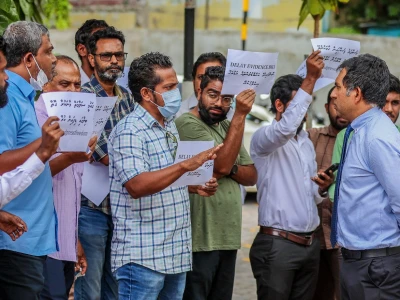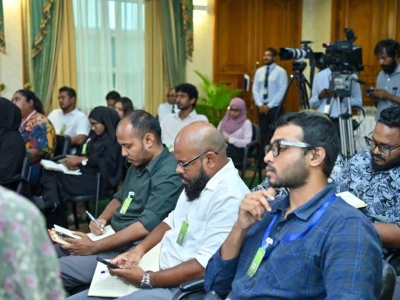
Evidence Act amendment fails in parliament
As the law stands, the circumstances under which journalists can be asked to disclose their sources are broadly interpretable.
Top Stories
By
Mariyam Umna Ismail
The government's proposal to amend the Evidence Act, specifying the High Court as the sole authority that can order a journalist to reveal their sources, has failed in parliament, as pro-government lawmakers voted against it on Wednesday.
When the parliament passed the Evidence Bill, designed to force journalists to disclose their sources, and ratified by President Ibrahim Mohamed Solih on July 18, journalists protested and expressed their concerns. In November, the government had proposed an amendment to the law to give only the High Court the authority to issue source disclosure orders.
When the report of the judiciary committee that reviewed the bill was tabled for vote in Wednesday's sitting, only 12 MPs voted in favour, while 31 voted against. The bill has now been sent back to the committee for another review.
As the law stands, the circumstances under which journalists can be asked to disclose their sources are broadly interpretable.
-
The law states that the journalist or the media can be compelled to disclose sources on the basis of a complaint filed by a person involved in a case; it does not specify a court
-
A court order may direct the journalist to disclose sources in cases of terrorism and national security, but it does not explicitly specify the circumstances under which national security and acts of terrorism can be applied to
-
Maldives Journalists Association (MJA) and Maldives Media Council (MMC) have called for the removal of Section 136 of the law as it poses a challenge to journalists and whistleblowers, undermining press freedom
After examining the bill, the judiciary committee also decided to grant only the High Court the power to direct the disclosure of sources as proposed by the government.
-
Section 136(c) of the Evidence Act states that while deciding whether it is proved on a civil basis, the court must take into account matters relating to the petitioner's application seeking direction to disclose the source
-
The committee decided to amend the law to make it clear that such a case can be brought to the High Court only and through the Prosecutor General
It also provides for the definition of "an offence involving an act prejudicial to national security" in the act. According to the bill, it is a cognisable offence involving unlawful activities and other acts of endangering the sovereignty or independence of the country and any other similar offence as defined in any other law.
Related
Related

Media bodies propose amendments to Evidence Act

MJA questions govt intention as Evidence Act fails in parliament

MPs slam bill on 'curtailing' journos access to polling stations

